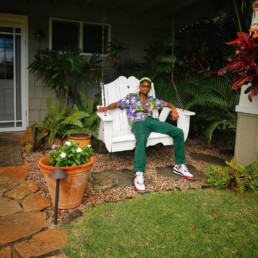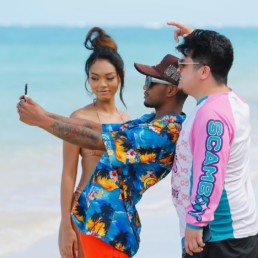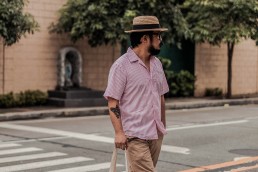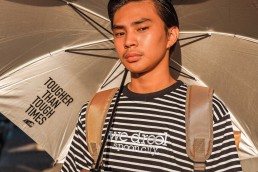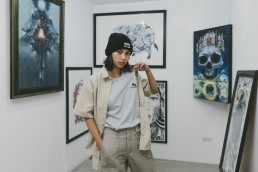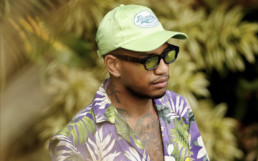
Guapdad 4000 is a Grammy-nominated and critically-acclaimed artist who has gained the co-sign of Drake, Snoop Dogg, J. Cole, Rick Ross, and built a strong following with his leftfield and refreshingly original artistic style. And yet he is still underrated and gets far from the mainstream recognition he deserves.
Under 88rising’s sister label PARADISE RISING, Guapdad 4000 released his sophomore album 1176 that follows his growing up years in a Black and Filipino household in Oakland, California. In the album, he recounted his experience growing up in a multicultural environment along with the challenges that come with it. Guapdad did not hold back in discussing everything about his growing up years and his unique life experiences and signature tongue-in-cheek humor. The 14-track album is produced by the legendary Filipino-American record producer !llmind.
We have had the pleasure of having a conversation with Guapdad 4000 about his album, his heritage, his creative process, and the merits of believing in yourself.
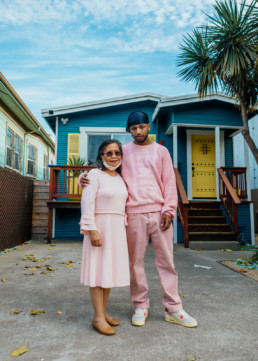
Guapdad 4000 and his beloved Lola
Congratulations on the new album! You discussed deeply personal themes and topics. Can you tell us what this project means to you?
This project means a lot to me because it’s about my childhood, it’s about everything that is me. It is me.
For those who encountered your music for the first time, how would you describe your musical style?
It’s very adaptive. I try a lot of different styles and I love to play with my voice, I like bending the pitch a bit. I like doing off-beat things, playing with cadences. Just being creative with it. It is whatever I need it to be.
You also take pride in your Filipino-American heritage. Can you tell us how your multicultural background shaped your artistry?
Being biracial is so cool especially with being black and Filipino specifically because both parts of my mix are so deep into the arts. They’re so creative and they’re so hands-on with everything so I had a lot of aunties and uncles on both sides that are singers, dancers, and painters. So being black and Filipino only adds to the amount of creativity I can pull from.
Do you have a musical memory that stands out when you look back on your childhood?
Man, I have a few but there were times where I would go Christmas caroling with my grandma. I remember that one time when we went out to San Jose. It was super cold and I had a hot chocolate from Starbucks on my hand. We would sing Silent Night and my grandma always takes it too far, singing hella high at the end of the song.
Did she teach you Filipino carols?
Yeah, we sang a few of them. I don’t remember the names but if someone started singing, I could probably sing along.
In “How Many”, you released a Filipino-translated lyric video. Will this be an ongoing theme for the album?
Yeah, I want to put a lot of emphasis on reaching out to Filipino people to let them know that I am Filipino as well and this is a place they can come to in terms of content that’s relatable. I don’t know if I’m going to represent being Filipino as heavy in the future but I will definitely always be doing things like that.
You rapped about your days growing up, doing illicit activities, alcoholism, and sex. Is there a topic that you would shy away from?
No. I want to talk about everything because the people wanna hear about everything. If they wouldn’t relate to what I’m talking about, I would shut my mouth. But being able to put out my music now, and see what ended up as a therapy for me also became a therapy for other people – it’s really beautiful.
Would you like to share your thoughts on issues of discrimination on Asian and Asian-Americans there in the US?
It’s been difficult for me to properly speak-out about these things. As a person from the Bay Area and as a Black and Filipino who’s always heavy on activism with Black Lives Matter and social injustices to Black people, I want to advocate for Filipino and Asian communities the same way. But it’s taking me a bit longer because I’m processing it more differently because I’m protective over my Lola. I just don’t want any harm to be brought to her so I’ve been trying to take some time to center myself with my family to make sure that she’s protected before I publicly speak about it.
The Asian community needs to know that there is solidarity and that everybody wants to see us win except for the enemy. But I think we should know that and it is up to us to step forward to protect ourselves first before anything else.
How has it been for you personally, growing up as an Asian-American? Please paint us a picture, what were the advantages and some disadvantages? Most of our readers are coming from the Philippines, so the cultural dynamic is far from what we’re used to and know.
Being Asian-American in the Bay Area is a very welcoming existence because the Bay Area specifically is such a melting pot of different cultures. It’s a big gumbo of just everything. There’s multiple languages in the Bay Area. But all my life, left and right, I’ve been pulled in different directions of cultures that I was exposed to. And a lot of those are Asians, a lot of Southeast Asians. A lot of Filipino people in the Bay. Thai, Laos, so we’ve always grown up around each other and it was cool to kick it and taste different foods and experience other people’s art and music. That’s what it’s like to become an Asian-American in the Bay.
I noticed that you are very close to your fans, enthusiastically responding to the questions on the comment section and sending love whenever you can. Why do you think this is important?
It’s all about engaging, man. I always loved the little moments I’ve had with artists. I remember when Twitter first came out — interacting with celebrities and getting a response at one point. I thought that was the coolest thing. To see Kanye West say something and you could like and just reply to it, and he could reply to you. I just thought it was so cool — that type of access. And on top of that, I just like to talk to people [laughs] It is fun to talk to people. I am a personal person so I wanna talk to fans, I don’t feel like these people are beneath me and I don’t need to comment. What matters is what I’m typing to that person at that moment, and that’s what I like about it.
Your recent interviews show that you’re confident about the quality of your upcoming album. Can you share to us the process it took to complete the album? What tracks should we not miss?
Man, the process to complete the music wasn’t hard. I have this story, I have the drama, I have the joy. I have the moments, you know, so it was easy talking about it. What was hard about making the album is the business behind it – deadlines, mixes, emails, zoom calls. [laughs] All of that gets jumbled and sometimes becomes overwhelming. So that’s what’s tough about finishing an album, but it’s all worth it when you see the end result. I put in the work and pushed myself to the limit and able to publish this beautiful thing that is this album, 1176.
If I had to say some songs not to miss off of it? “Big Shot”, “Downgrade”, and “Chicken Adobo”.
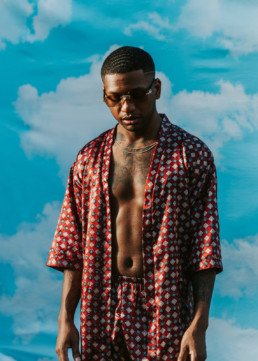
The outro song was pretty good. When you were sharing about your dad, I knew it felt therapeutic for you to share it on record and creatively.
Thank you. It was something that I didn’t even mean to say. Like I didn’t write that bar down. I was freestyling at that point and it kinda came out. It’s funny because it wasn’t like a major thing so when it kinda came out, I was like maybe I need to say that.
Another detail I caught is that you purposefully removed big names in the album tracklist in order to make a more cohesive narrative. Can you drop some names?
There were a lot of people. J.I.D, Smino. In another song, there was BJ the Chicago Kid. Rick Ross, Super Duper Kyle.
Rick Ross just co-signed your album. You mentioned that he is one of the artists you want to work with. Can you let us in on how this feels for you — getting recognized by people who look up to you in a field you dream about succeeding?
Man, it’s so crazy for me to be given the recognition with that co-sign, it’s ridiculous. I feel undeniable, I feel undefeated.
Who do you want to be on the list of that growing co-sign list?
Pharell for sure. Dr. Dre. 50 Cent. I have a more tasteful list with Andre 3000, but I want a co-sign from the mogul millionaires who are also hyper creative. I want their co-sign because I want to know their trajectory.
Images — Guapdad 4000’s Instagram
You have mentioned struggling with your identity in your interviews. Is it different now? How were you able to embrace the balance of two cultures?
I just grew into it. I was born into it and matured into it. As a teenager, and in the middle of my life so far, you know, you kinda go to this crisis where you don’t know what to feel but like I feel like I’ve discovered a good balance [by] just existing. Want to cook food? I got two ways to season. Which is like I’m two at the same time, like black and Filipino. One thing but it’s two.
Following the strong reception of your debut album, how would you like this album to be received by fans and the community at large?
I just want them to listen to it from top to bottom. There’s no better way to enjoy the music. That’s all any artist wants is just intention and appreciation. That’s all I expect and hope for this album. In terms of accolades or streaming or any of that, it will come if it’s supposed to come.
You have accomplished a lot since you started making music. What do you think brought you success? What are the things that pushed you to keep at it?
Family. My little sister, my mama, my brothers, my grandma. Belief in myself, honestly. I believe in myself wholeheartedly and undyingly. I believe in myself more than I believe in science. That is often all I had because when people didn’t believe in me, all I had was myself. That’s the driving force for my work.
Looking back, what are the most significant things you have learned in your journey? Do you have an anecdote that stands out?
The greatest thing that I like to tell people, and I tell it all the time, is don’t wait. Don’t wait. DO NOT WAIT. If you think you have a million dollar idea, start it right now when you only got $30. A trillion starts at 30. Instantly start all your ideas cause I guarantee you that that first one may not even be it. Once you get into the motion of instantly acting on things you believe in and things that motivate you, it will click for yourself and you say oh this is what it’s like to be a go-getter. That’s how you have to be, you gotta act. You can’t wait. Anybody that’s sitting on a good idea has a poor mindset because they’re waiting on help to execute.
Do you have tips to aspiring rappers and musicians whose career is yet to take off?
Keep making songs. Keep making songs! I just dropped an album, it’s the most stressful time of my life and in a pandemic where everything is going bad, I still haven’t stopped recording. Yesterday I made four songs in the middle of rollout week. Never stop making songs. Before I didn’t have a studio to record and I was recording on the voice notes on my phone.
And you never miss, every song you put out is a hit.
You gotta keep swinging, that’s why.
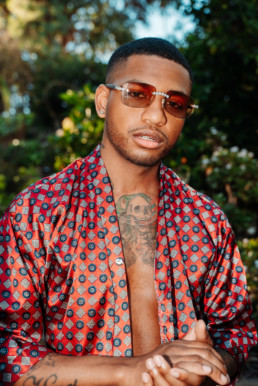
Is representation important to you? Being biracial, it may have been difficult to find that growing up.
Honestly, some things that inspired me to go forward with this type of moment were comic books. I read a lot of comic books and one of them was Spider-Man. Miles Morales is biracial. He’s not Asian and Black, he’s Black and Latino but I think his character is so cool. I like to look up to his character. And that’s how I want people to look at me and my brand as a Black and Filipino. As a rapper, I want to look like that type of superhero. When you’re watching a Miles Morales story you don’t see them like oh man they’re trying to make Spider-Man black or Spider-Man cool or some shit like that. You look at that and say that’s just who he is and that’s what I want with my brand and how people see me, to look at me, I’m Black and Filipino, this is what I do and that’s just how I am.
Also, some cooler shit, my work makes Filipino people look cooler when people accept the culture more because I’m cool. So that’s why I like doing it. It’s not like I’m faking, you know, anything.
Can you share your journey with !llmind in creating 1176? How did he become pivotal to the album’s storytelling?
A lot of people don’t know I flew to New Jersey to work with !llmind. He stays in the Filipino side of New Jersey. So we’re in a Filipino town and we would hop out and go to different Filipino-owned restaurants, eat different food, and just hang out in the Airbnb. Sometimes it’s tight, sometimes it’s nasty. I was like that’s because we’re in New Jersey. I was roasting them.
His influence came from us linking together as soon as we found out that we’re Filipino. The bond was stronger like ayyy dawg you my brother now and started calling each other kuya. We chillin. We just instantly bonded, it’s like a different chemistry. It’s tight when you’re making music with somebody because now you got more things to pull from because we share the nostalgia from the same memories, the same food, and the same smells, the same environment, and the same things we were dealing with. Anybody that’s Filipino got that crazy tito stories. You know? It’s those types of things where we bonded together that added to the music. It’s also cool to link up with a Filipino musician that also has so many accolades. Like !llmind is a legend. He also won a Grammy; I’m Grammy-nominated.
I’m happy to do it with a Filipino as well and present this art to the world.

